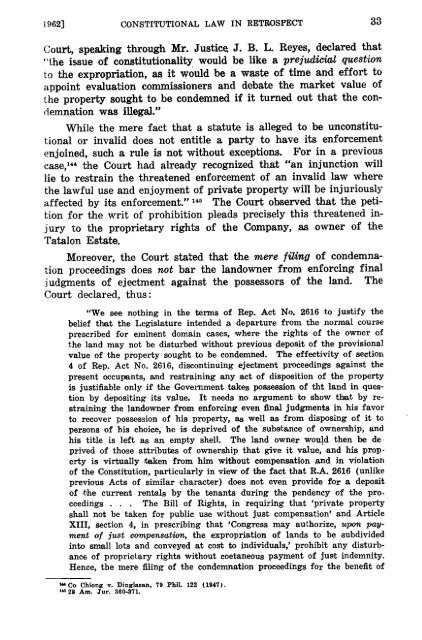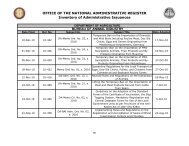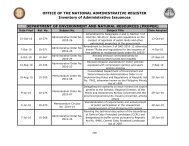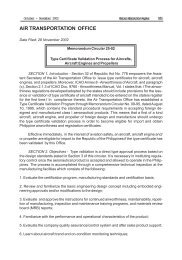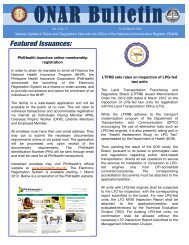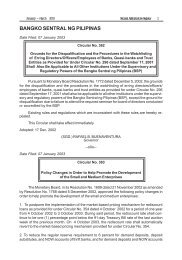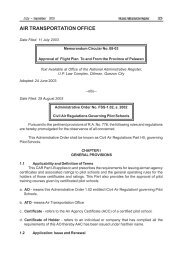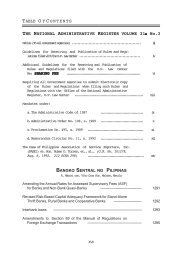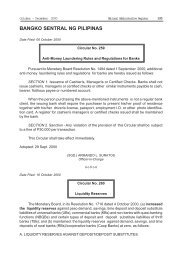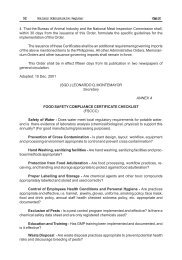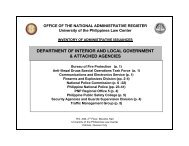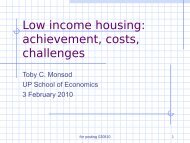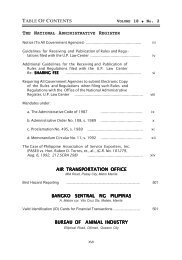PLJ volume 37 number 1 -01- Deogracias Eufemio
PLJ volume 37 number 1 -01- Deogracias Eufemio
PLJ volume 37 number 1 -01- Deogracias Eufemio
Create successful ePaper yourself
Turn your PDF publications into a flip-book with our unique Google optimized e-Paper software.
Court, speaking through Mr. Justice J. B. L. Reyes, declared that<br />
"the issue of constitutionality would be like a prejudicial question<br />
to the expropriation, as it would be a waste of time and effort to<br />
appoint evaluation commissioners and debate the market value of<br />
the property sought to be condemnedif it turned out that the condemnation<br />
was illegal."<br />
While the mere fact that a statute is alleged to be unconstitutional<br />
or invalid does not entitle a party to have its enforcement<br />
enjoined, such a rule is not without exceptions. For in a previous<br />
case,144the Court had already recognized that "an injunction will<br />
lie to restrain the threatened enforcement of an invalid law where<br />
the lawful use and enjoyment of private property will be injuriously<br />
affected by its enforcement."146 The Court observed that the petition<br />
for the writ of prohibition pleads precisely this threatened injury<br />
to the proprietary rights of the Company, .as owner of the<br />
Tatalon Estate.<br />
Moreover, the Court stated that the mere filing of condemnation<br />
proceedings does not bar the landowner from enforcing final<br />
judgments of ejectment against the possessors of the land. The<br />
Court declared, thus:<br />
"We see nothing in the terms of Rep. Act No. 2616 to justify the<br />
belief that the Legislature intended ,a departure from the normal course<br />
prescribed for eminent domain cases, where the rights of the owner of<br />
the land may not be disturbed without previous deposit of the provisional<br />
value of the property sought to be condemned. The effectivity of section<br />
4 of Rep. Act No. 2616, discontinuing ejectment proceedings against the<br />
present occupants, and restraining any act of disposition of the property<br />
is justifiable only if the Governmenttakes possessionof tht land in question<br />
by depositing its v,alue. It needs no argument to show that by restraining<br />
the landowner from enforcing even final judgments in his favor<br />
to recover possessionof his property, as well as from disposing of it to<br />
persons of his choice,he is deprived of the substance of ownership, and<br />
his title is left as ,an empty shell. The land owner would then be de·<br />
prived of those attributes of ownership that give it value,',and his prop·<br />
erty is virtually taken from him without compensation ,and in violation<br />
of the Constitution,particularly in view o·fthe fact that R.A. 2616 (unlike<br />
previous Acts of similar character) does not even provide for a deposit<br />
of ,tlhecurrent rentals by the tenants during the pendency of the pro.<br />
ceedings . . . The Bill of Rights, in requiring that 'private property<br />
shall not be taken for public use without just compensation' and Article<br />
XIII, section 4, in prescribing that 'Congress may authorize, upon payment<br />
of just oompensation, the expropriation of Iands to be ,subdivided<br />
into small lots and conveyedat cost to individuals,' prohibit any disturbance<br />
of proprietary rights without coetaneouspayment of just indemnity.<br />
Hence, the mere filing of the condemnationproceedingsfOr the benefit of


